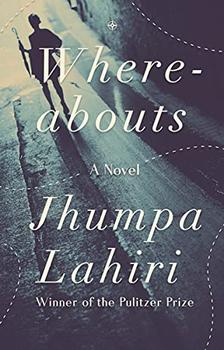Summary | Excerpt | Reviews | Beyond the Book | Read-Alikes | Genres & Themes | Author Bio

This article relates to Whereabouts
Jhumpa Lahiri wrote her novel Whereabouts in Italian, a language she learned in adulthood, and later translated it into English. Many authors have at some time made the decision to become exophonic (to write in a language other than one's native tongue), whether for personal, artistic, practical or political reasons.
The author who is possibly best known for doing this is Irish writer Samuel Beckett, who famously adopted French in order to write "sans style" (without style). While he eventually returned to English, some of his most famous works were originally composed in French, including the play En attendant Godot (Waiting for Godot) and the trilogy of novels beginning with Molloy.
Hungarian writer Ágota Kristóf's short novel Le Grand Cahier (The Notebook) is sometimes recommended as an easy read for French learners, as Kristóf wrote it while still attempting to master the language herself after having fled her native country for Switzerland. Mieke Chew contrasts Kristóf with Beckett as a French language learner turned writer, remarking, "Unlike Beckett, who kept language itself at arm's length for the sake of form, she did not experiment with French out of artistic ambition, but in order to live and be understood, not playfully, but with rigor and dedication to correctness—and she did so to devastating effect."
Another exiled writer, Vladimir Nabokov, is best known for the work he produced in English after moving to the United States, including Lolita and Pale Fire. His earlier novels were written in his native Russian, and he once noted, "My private tragedy, which cannot, indeed should not, be anybody's concern, is that I had to abandon my natural language, my natural idiom, my rich, infinitely rich and docile Russian tongue, for a second-rate brand of English."

Edwidge Danticat, Haitian American author of Breath, Eyes, Memory, Everything Inside and other works, is a contemporary exophonic writer. Though Danticat grew up with Haitian Creole as her primary language and was taught in French at school as a child, she began to compose stories in English soon after coming to the US at a young age. In an interview, Danticat explained, "I came to English at a time when I was not adept enough at French to write creatively in French and did not know how to write in Creole because it had not been taught to me in school, so my writing in English was as much an act of personal translation as it was an act of creative collaboration with the new place I was in."
In her 2017 essay "To Speak Is to Blunder," Yiyun Li — author of Gold Boy, Emerald Girl; Where Reasons End; and other novels and story collections — recounts how for her the act of choosing to write in English, along with the rejection of her mother tongue, Chinese, has come with harsh and complicated implications but feels necessary. Reflecting on Nabokov's comment about giving up writing in Russian, she forms her own sentiment around his words: "If I allow myself to be honest, my private salvation, which cannot and should not be anybody's concern, is that I disowned my native language."
Lahiri's 2015 essay "Teach Yourself Italian" (itself translated from Italian by Ann Goldstein), on her journey to writing in the language, introduces some interesting parallels and contrasts to Li's experience. Lahiri's relationship to language is informed by her parents' Bengali, in which she has always lacked some degree of fluency despite it being her mother tongue, as well as English, in which she initially wrote fiction. Regarding her fledgling attempts to write in Italian, she states, "I think I am escaping both my failures with regard to English and my success. ... I'm bound to fail when I write in Italian, but, unlike my sense of failure in the past, this doesn't torment or grieve me."
Filed under Books and Authors
![]() This "beyond the book article" relates to Whereabouts. It originally ran in June 2021 and has been updated for the
March 2022 paperback edition.
Go to magazine.
This "beyond the book article" relates to Whereabouts. It originally ran in June 2021 and has been updated for the
March 2022 paperback edition.
Go to magazine.
The third-rate mind is only happy when it is thinking with the majority. The second-rate mind is only happy when it...
Click Here to find out who said this, as well as discovering other famous literary quotes!
Your guide toexceptional books
BookBrowse seeks out and recommends the best in contemporary fiction and nonfiction—books that not only engage and entertain but also deepen our understanding of ourselves and the world around us.